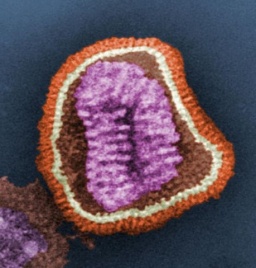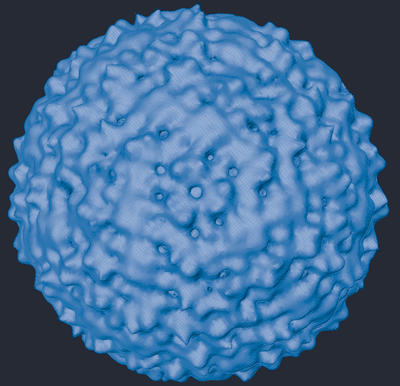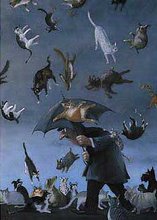Are Viruses Alive?
From Microbial Life - Educational Resources
Created by George Rice, Montana State University

"Viruses straddle the definition of life. They lie somewhere between supra molecular complexes and very simple biological entities. Viruses contain some of the structures and exhibit some of the activities that are common to organic life, but they are missing many of the others. In general, viruses are entirely composed of a single strand of genetic information encased within a protein capsule. Viruses lack most of the internal structure and machinery which characterize 'life', including the biosynthetic machinery that is necessary for reproduction. In order for a virus to replicate it must infect a suitable host cell".
"Viruses exist in two distinct states. When not in contact with a host cell, the virus remains entirely dormant. During this time there are no internal biological activities occurring within the virus, and in essence the virus is no more than a static organic particle. In this simple, clearly non-living state viruses are referred to as 'virions'. Virions can remain in this dormant state for extended periods of time, waiting patiently to come into contact with the appropriate host. When the virion comes into contact with the appropriate host, it becomes active and is then referred to as a virus. It now displays properties typified by living organisms, such as reacting to its environment and directing its efforts toward self-replication".

Viruses infect all forms of life, are found in almost every ecosystem on Earth, and are the most abundant type of biological entity on the planet.
...if a different criterion for defining life would be the ability to move a genetic blueprint into future generations, thereby regenerating your likeness..., viruses are definitely alive. They are undeniably the most efficient entities on this planet at propagating their genetic information.
Although there is no definitive resolution to the question of whether viruses can be considered living entities, their ability to pass on genetic information to future generations makes them major players in an evolutionary sense.
It is a surprise to most who think of viruses simply as parasites that they make up the largest component of biomass on this planet . When considering that not only is viral presence on this planet all encompassing, but every sequenced organism to date has a major component of its genome that is viral in origin, it becomes apparent that viruses are integral players in the evolution of what we presently consider life.
Maybe the pertinent question is not whether viruses are alive, but rather to what extent do they play a role in the movement and molding of life as we perceive it today?












Sem comentários:
Enviar um comentário